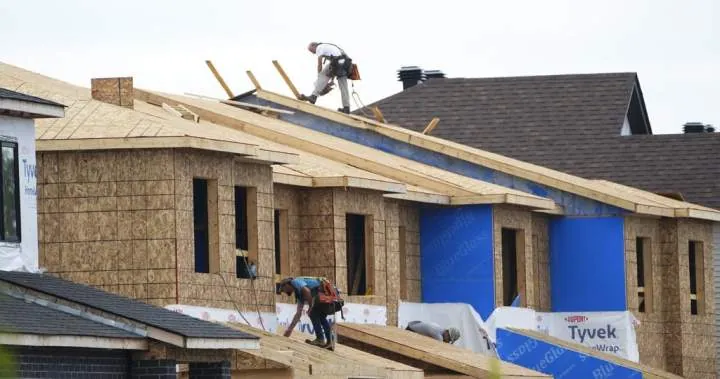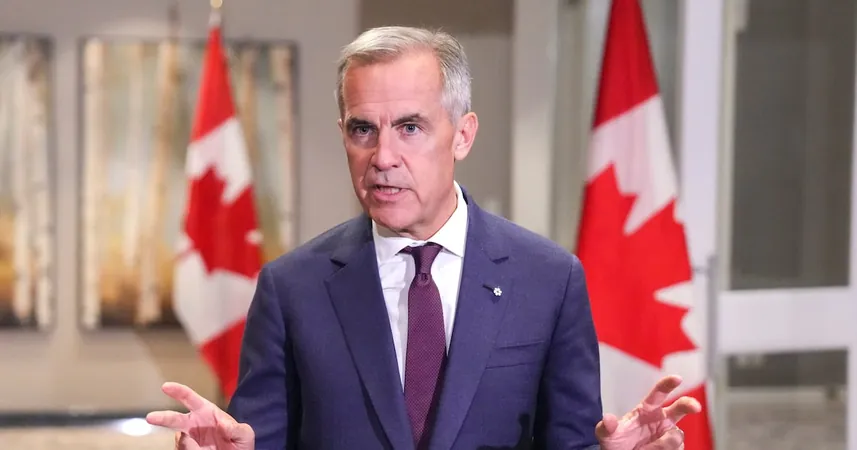
Canada's Housing Construction Crisis: Are We Too Slow to Meet Demand?
2025-09-09
Author: Amelia
Stagnant Housing Starts Fail to Solve Affordability Crisis
Despite a steady rate of construction, Canada is still woefully behind in addressing its affordable housing shortfall. A recent report reveals that builders initiated a similar number of new homes in early 2025 compared to the previous year, which is insufficient to combat the ongoing crisis.
Toronto on Track for Historic Low Housing Starts
In particular, Ontario's housing market is in dire straits. The Canada Mortgage and Housing Corporation (CMHC) warns that 2025 is projected to witness the fewest housing starts in three decades in Toronto. This alarming trend poses serious threats not only to housing supply but also to workforce retention and overall affordability.
Challenges Burdening Developers
Tania Bourassa-Ochoa, CMHC’s deputy chief economist, highlights that onerous development charges and prolonged approval processes are crippling developers. Her assertion calls for systemic reforms to streamline Canada’s housing framework, thereby enabling faster and more cost-effective construction.
Regional Disparities in Housing Construction
The CMHC’s latest report reviews housing starts across major cities, indicating significant variances. While Calgary, Edmonton, Montreal, and Halifax saw an uptick in construction, sprawling urban centers like Toronto and Vancouver are experiencing declines.
Notably, July 2025 recorded a staggering 25% drop in housing starts in the Greater Toronto Area compared to July 2024, further emphasizing the inconsistency within the national housing landscape.
A Bleak Future Without Major Changes
Robert Hogue from the Royal Bank of Canada expresses concerns about the divided housing market, pointing out that while some regions flourish, others, particularly in the Greater Toronto Area (GTA), are struggling. A prior report from the Parliamentary Budget Office estimates that Canada is on track to construct only 2.5 million new homes by 2035—700,000 fewer than the 3.2 million needed.
Government Initiatives to Boost Construction
Prime Minister Mark Carney is attempting to tackle this pressing issue with a new series of policies aimed at speeding up home construction, including the removal of interprovincial trade barriers which could enhance housing starts. However, economists like Hogue remain skeptical about the achievability of these ambitious targets.
Affordability Crisis Looms as Demand Surges
With the economy needing more affordable housing options, any delay in resolving construction challenges threatens to exacerbate affordability issues. If demand continues to exceed supply, soaring prices could push many prospective buyers out of the market altogether.
Calls for Change in Housing Policy
In light of these challenges, Conservative Party Leader Pierre Poilievre is urging Prime Minister Carney to consider alternative measures, such as reducing sales taxes to improve housing affordability.
As developers grapple with financing, labor shortages, and complex municipal processes, the need for simpler, more efficient pathways to housing development has never been clearer. Bourassa-Ochoa insists that without addressing these underlying obstacles, the industry sentiment will remain low, and the prospect of meeting federal housing targets looks grim.









 Brasil (PT)
Brasil (PT)
 Canada (EN)
Canada (EN)
 Chile (ES)
Chile (ES)
 Česko (CS)
Česko (CS)
 대한민국 (KO)
대한민국 (KO)
 España (ES)
España (ES)
 France (FR)
France (FR)
 Hong Kong (EN)
Hong Kong (EN)
 Italia (IT)
Italia (IT)
 日本 (JA)
日本 (JA)
 Magyarország (HU)
Magyarország (HU)
 Norge (NO)
Norge (NO)
 Polska (PL)
Polska (PL)
 Schweiz (DE)
Schweiz (DE)
 Singapore (EN)
Singapore (EN)
 Sverige (SV)
Sverige (SV)
 Suomi (FI)
Suomi (FI)
 Türkiye (TR)
Türkiye (TR)
 الإمارات العربية المتحدة (AR)
الإمارات العربية المتحدة (AR)